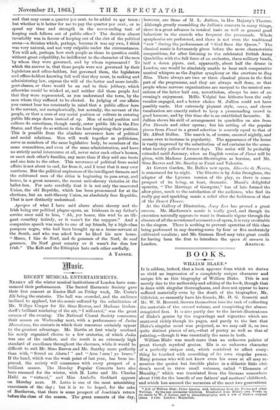ii 110
RECENT MUSICAL ENTERTAINMENTS.
NEARLY all the winter musical institutions of London have com-
menced their performances. The Sacred Harmonic Society gave their first concert at Exeter Hall on Friday week, Mr. Costa's
Eli being the oratorio. The hall was crowded, and the audience inclined to applaud, but the music suffered by the substitution of Mr. Wilbye Cooper for Mr. Sims Reeves, and Madame Butlers- dorff's brilliant rendering of the air, "I will extol," was the great success of the evening. The National Choral Society commence their season on Wednesday next, with a performance of Judas 111-accalimus, the oratorio in which their resources certainly appear to the greatest advantage. Mr. Martin at first wisely confined his newly organized chorus to a few oratorios, of which Judas was one of the earliest, and the result is an extremely high standard of excellence throughout the choruses, while it would be difficult to suit Mr. Sims Reeves and Mr. Santley more perfectly than with, "Sound an Alarm ! " and "Arm ! arm ! ye brave." If the band, which was the weak point of last year, has been im- proved, the society will commence with every prospect of a brilliant season. The Monday Popular Concerts have also been resumed for the winter, with M. Lotto and Mr. Charles Halle' as "virtuosi," and Miss Arabella Goddard appears on Monday next. M. Lotto is one of the most astonishing executants of the day ; but it is to be hoped, for the sake of Beethoven, that there is some prospect of Joachim's return before the close of the season, The great concerts of the day, however, are those of M. L. Jullien, in Her Majesty's Theatre. Although greatly resembling the Jullien's concerts in many things, there is a groat advance in musical taste AB well as general good
behaviour in the crowds who frequent the promenade. Whole symphonies are performed, and there is not oven the traditional " row " during the performance of "God Save the Queen." The classical music is fortunately given before the more characteristic compositions, for after listening to the celebrated British Army
Quadrilles with the full force of an orchestra, three military bands, half a dozen pipers, and, apparently, about half the drums in London, one would be absolutely unable to hear such comparative musical whispers as the Jupiter symphony or the overture to Ray Bias. There always are two or three classical pieces in the first part of the programme, and they are always well done, so that people whose nervous organizations are unequal to the musical sen- sations of the latter half can, nevertheless, always be sure of an evening's enjoyment. Mdlle. Volpini has hitherto been the only vocalist engaged, and a better choice M. Jullien could not have possibly made. Her extremely piquant style, verve, and clever vocalization are exactly suited to keep a promenading crowd in good humour, and by this time she is an established favourite. M. Jullien shows his skill of arrangement in quadrilles on airs from Fra Diavolo and other operas ; but his setting of the popular pieces from Faust in a grand selection is scarcely equal to that of Mr. Alfred Mellon. The march is, of course, encored nightly, and seems even to increase in popularity. The appearance of the house is vastly improved by the substitution of red curtains for the some- what tawdry yellow of former days. The series will be probably extended until January, when an English version of Faust will be given, with Madame Lemmens-Sherrington as heroine, and Mr. Sims Reeves and Mr. Santley as Faust and Valentin.
At Covent Garden, Mr. Balfe's new opera, Blanche de 'fevers, is announced for to-night. The libretto is by John Brougham, the adapter of the Lyceum version of the play, so there is some prospect of its being, at least, dramatic. Masse's delightful operetta, "The Marriage of Georgette," has of late formed the after-piece, much to the satisfaction of the audience, who find its really gay and sparkling music a relief after the feebleness of that of the Desert Flower.
At the Gallery of Illustration, .Iesqy Lea has proved a great success. Mr. Macfarren's music is really good, and though its execution naturally appears to want in dramatic vigour through the absence of all the accustomed accessories of opera, it is very creditable to the singers. There is nothing to prevent operettas of this class being performed in any drawing-room by four or five moderately cultivated vocalists ; and Mr. German Reed may take great credit for having been the first to introduce the opera di camera in






























 Previous page
Previous page